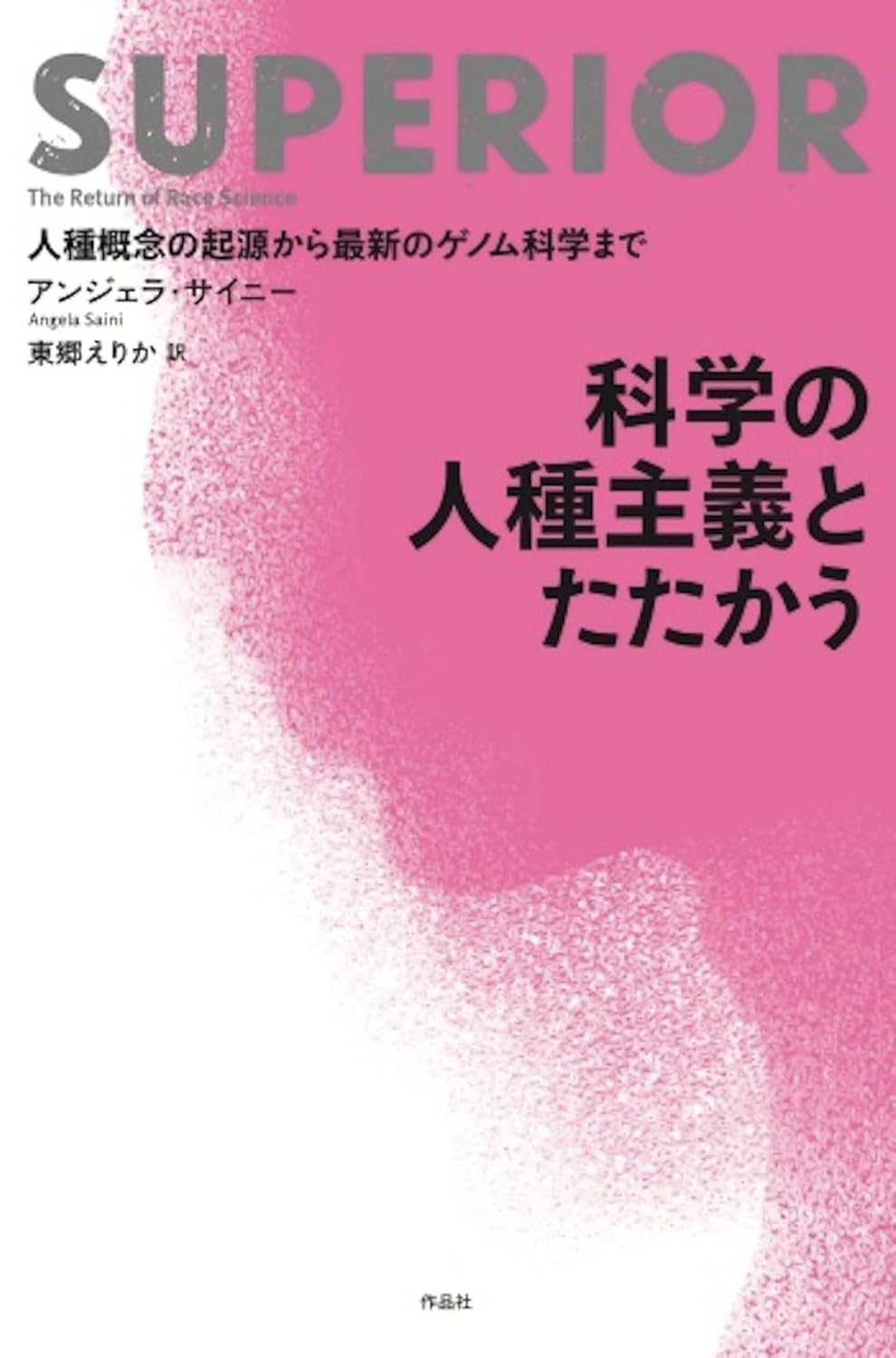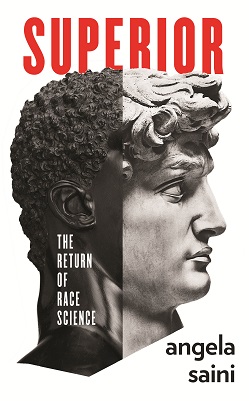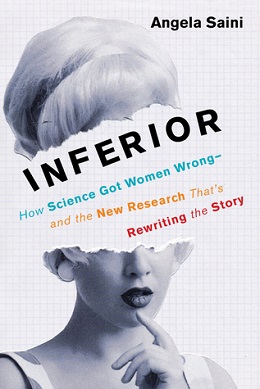Superior : the return of race science, by Angela Saini




書肆紹介:「人種は、権力によって形づく られ、科学によって根拠付けられ、数百年にわたって信じられてきた—。第二次世界大戦中のナチによる凄惨な虐殺の後、科学の人種主義は姿を消したかにみえ た。しかし、人種主義は新たなる危機となって再来する…。人種概念の起源、優生学の歴史をたどり、最新のゲノム科学とそれを巧みに利用する人種主義者の現 状までも論じる科学ルポルタージュ。科学の仮面をかぶった人種主義に、世界を代表するサイエンスライターが立ち向かう!」
★著書『Superior』で、サイニは 自身のロンドンの白人街での子供時代を題材としている。当時彼女が直面した人種差別が、不正を明らかにしようとするジャーナリズムのスタイルへと彼女を駆 り立てた。人種遺伝学への彼女の新たな関心は、遺伝的に異なる人種集団を指し示していると思われる研究を白人至上主義運動が利用したことによってかき立て られた。 サイニはまず、科学上の人種主義の歴史を、人間の身体的特徴や人種に基づく性格特性の主張に基づく体系的な分類という起源から、リンネ、ダーウィン、ハク スリーなど、多くの科学者が採用したアプローチについて述べている。彼女はさらに、20世紀の人類学や生物学がこれらの理論を受け入れ、ナチス政権下で政 治的教義に組み込まれたことについても言及している。彼女は、人種カテゴリーがかなり短い期間で変化してきた経緯をたどり、それらが社会的に構築されたも のであることを明らかにしている。[3][4][5][6][7][8] サイニは、戦後、このアプローチを否定する意図的な努力がなされたにもかかわらず、ホモ・サピエンスのいくつかの品種は本質的に他のものよりも優れている (またはより進化した)という疑似科学的主張が生き残っただけでなく、復活していると主張している。奴隷貿易、人種に基づく移民、ホロコーストなどのイデ オロギーに利用されてきた科学上の人種主義は、今日では白人至上主義の目的のために利用されている。 生物学における人種の概念を研究する今日の科学者は、19世紀の同業者と同等の存在ではないと認める一方で、サイニ氏は、このような研究アプローチが有益 な発見をもたらすかどうか疑問を呈している。[4] 彼女は、公衆衛生や医学において人種や民族に焦点を当てることは、すでに健康状態に影響を与えることが証明されている環境的要因、例えば社会経済的条件な どを見落とす可能性があると主張している。人種の概念が実際の遺伝的差異に対応するという考えを蒸し返すことで、白人ナショナリズム運動の再興を助長する ことにもなる。[1][8][9]
【アンジェラ・サイニーの主張】科学人種
主義は、(彼女の見解によると)第二次大戦後の優生学思想の反省による停滞期から、21世紀以降、逆に高まっている。前著の手法を通して、科学における人
種主義の再流行をどのように防ぐのかが、問われている。
■1.
太古の昔—私たちはヒトという一つの生
物種なのか、違うのか?
■2.
イッツ・ア・スモール・ワールド—科学
者はどうやって人種の物語に入り込んだのか?
■3.
科学的偽善売教—人種は改良されうるの
だと考え、科学者はみずからの人種を改良する方法を探した
■4.
仲間内で—戦後、知的人種主義者は新し
いネットワークを築きあげた
■5.
人種現実主義者—人種主義を再び社会的
に認めさせる
■6.
人間の生物多様性—二一世紀に人種はど
のようにブランド再生されたか
■7.
ルーツ—新しい科学研究に照らし合わせ
ると、人種はいま何を意味するのか
■8.
起源の物語—科学的事実がつねに重要に
ならないのはなぜか
■9.
カースト—一部の人種はほかの人種より
も賢いのか?
■10.
黒人用医薬—人種別化した薬がなぜ効か
ないか
■11.奇術師—生物学的決定論のウサギ 穴に落 ちて
※クレジット:アンジェラ・サイニー『科
学の人種主義とたたかう : 人種概念の起源から最新のゲノム科学まで』ノート
| 7 |
序章 | ・人間の差異(9) ・ブルーメンバッハ ・ヘフニー〈対〉アメリカ政府(11) ・自らの人種差別体験(15) |
| 17 |
1. 太古の昔—私たちはヒトという一つの生 物種なのか、違うのか? | ・マルカ洞窟 ・ウィリアム・ダンピア ・ジョン・マルヴァニー ・アボリジニーの子ども略奪 ・カントとヘーゲルはレイシスト(32) ・オーストラリアの民族浄化 ・1856年ネアンデル谷での発見 ・我々は永遠に人類の起源を求める(38) ・アフリカ単一起源説への不機嫌と、他地域進化説(42) ・ネアンデルタールとの「交雑」問題:人種リビジョニズム? ・ミルフード・ウォルポフ(48) |
| 55 |
2. イッツ・ア・スモール・ワールド—科学 者はどうやって人種の物語に入り込んだのか? | ・人種理論と未開民族の「標本化」 ・Racecraft 2012.(→人種術)72 |
| 75 |
3. 科学的偽善売教—人種は改良されうるの
だと考え、科学者はみずからの人種を改良する方法を探した |
・マックス・プランク研究所(75-) ・オトマール・フライヘア・フォン・ヴェルシュアー(78) ・ゴルトン(82) ・強制不妊手術(090)[→バック対ベル訴訟, 1927] ・優生学 ・オイゲン・フィッシャー(93) ・マディソン・グラント(96)[→マディソン・グラントと優生学の時代] ・日本の強制不妊手術 |
| 103 |
4. 仲間内で—戦後、知的人種主義者は新し いネットワークを築きあげた | ・レジナルド・ラグルス・ゲイツ(103) ・アシュレイ・モンタギュー(106) ・リチャード・ルウォンティン(108) ・マンカインド・クォータリー(116) ・知能と「人種」(124)[→「人種」と知性をめぐる論争史] |
| 133 |
5. 人種現実主義者—人種主義を再び社会的 に認めさせる | ・ウィ
クリフ・ドレーパー(133) ・ピアソン(134)[→カール・ピアソンと優生学] ・リチャード・リン[→リチャード・リンの研究] ・ベル・カーブ(149)→「『ベルカーブ:アメリカ人の生活における知性と階級構造』」 |
| 159 |
6. 人間の生物多様性—二一世紀に人種はど のようにブランド再生されたか | ・右派ポピュリストとベルカーブ ・カヴァッリ=スフォルツァ(170-180)[→ルイジ・ルカ・カヴァリ=スフォルツァ] ・ |
| 195 |
7. ルーツ—新しい科学研究に照らし合わせ
ると、人種はいま何を意味するのか |
・ディヴィツド・ライク(206)→「デイヴィッド・ライク」→人種概念を捨てない彼(214)※レイシストではないが、「人種」
概念をつかう研究者の存在 ・ライクは、反人種主義者の極論と、非科学的態度が気に入らない。 ・ワトソンは、レイシストのまえに、セクシストだ。 |
| 223 |
8. 起源の物語—科学的事実がつねに重要に ならないのはなぜか | ・アメリカの例外主義の起源(224) ・ソリュトレ仮説(226)はもはやイデオロギー化されている ・ケネウィックマン論争(234-) ・グスタフ・コシンナ[コッシナ](240) ・ヒンドゥーナショナリズムと科学(246) |
| 253 |
9. カースト—一部の人種はほかの人種より も賢いのか? | ・ロバート・プロミン(Robert Plomin,
b.1948) ・アーサー・ジャンセン(264)→「人種と知能」▶「人種と知能 02」▶「人種と知能 03」 ・知性差の遺伝的根拠の生物学的証明は、ゼノンのパラドックスのように近づいても近づいても離れていく(270) ・フリン効果(275) |
| 287 |
10. 黒人用医薬—人種別化した薬がなぜ効か ないか | ・生存率に「人種差」があらわれたら、医学者はどう考えるのか? |
| 319 |
11.奇術師—生物学的決定論のウサギ穴に落 ちて | ・SUSHI遺伝子(320)——ブルース・ラーン. ・人種術 |
| 339 |
あとがき |
++
| Angela Saini (born
1980) is a British science journalist, broadcaster and the author of
books, of which the fourth, The Patriarchs: The Origins of Inequality,
was published in 2023 and was a finalist for that year's George Orwell
Prize for Political Writing.[1][2] Saini has worked as a reporter and
presenter for the BBC and has written for a number of publications
including The Guardian, New Scientist, and Wired UK. She has also
produced and presented several radio and television
documentaries,[3][4] including a BBC Radio 4 documentary on biofuels
and a BBC World Service documentary on the impact of climate change on
Indian agriculture. Saini's writing and reporting focus on how science
interacts with society, especially on how it affects marginalized
groups, and she has been acclaimed for her work by a diverse range of
organizations and institutions. |
アンジェラ・サイニ(1980年生まれ)は、イギリスの科学ジャーナリ
スト、放送作家、著述家で、そのうちの4作目『The Patriarchs: The Origins of
Inequality』は2023年に出版され、同年のジョージ・オーウェル賞(政治的著述部門)の最終選考に残った。また、バイオ燃料に関するBBCラ
ジオ4のドキュメンタリーや、気候変動がインドの農業に与える影響に関するBBCワールドサービスのドキュメンタリーなど、ラジオやテレビのドキュメンタ
リー番組[3][4]を制作・発表している。サイニの執筆と報道は、科学が社会とどのように相互作用しているか、特に社会から疎外された集団にどのような
影響を与えているかに焦点を当てており、その活動はさまざまな組織や機関から高く評価されている。 |
| Education She holds two master's degrees: one in Engineering from the University of Oxford, and one in Science and Security from the Department of war studies at King's College London.[5][6] She was a student at Keble College, Oxford.[7] |
教育 彼女は2つの修士号を取得している。1つはオックスフォード大学で工学、もう1つはキングス・カレッジ・ロンドンの戦争研究学部で科学と安全保障である。 [5][6] 彼女はオックスフォード大学キーブル・カレッジの学生であった。[7] |
| Career Saini worked as a reporter at the BBC, and left in 2008 to become a freelance writer.[8] In 2008 Saini won a Prix CIRCOM for her investigation of fake universities, focusing on Isles International University.[9][10] She was named European Young Science Writer of the Year in 2009.[11][12] In 2012, she won the Association of British Science Writers Award for best news item published in 2011.[13] She was a Knight Science Journalism Fellow at the Massachusetts Institute of Technology between 2012 and 2013.[14] In 2015 she won the American Association for the Advancement of Science Gold Award.[15] In August 2017, an internal memo written by a Google employee about the company's diversity policies, (Google's Ideological Echo Chamber), received public attention. Saini criticised the memo, calling it "[not] just intellectual laziness; [but] prejudice masquerading as fact".[16][17] Television appearances Saini appeared on the 2018/19 Christmas University Challenge series representing King's College London, alongside Anita Anand (captain), Zoe Laughlin, and Anne Dudley.[18] Saini presented the BBC Four documentary Eugenics: Science's Greatest Scandal, with disability rights activist and actor Adam Pearson.[19] Books Saini's first book, Geek Nation: How Indian Science is Taking Over the World, was published in 2011. Her second book, Inferior: How Science Got Women Wrong and the New Research That’s Rewriting the Story, was published in 2017,[20] a non-fiction book that explores the history of science's understanding of sex differences and the impact of this understanding on women's lives. The book delves into how scientists, researchers and society at large, have treated women as intellectually, emotionally and physically inferior to men for centuries. Through her research, Saini presents evidence to dispute these long-held beliefs, and how contemporary research is now challenging the traditional narrative about the differences between men and women. The book covers many historical as well as contemporary examples of bias and mistreatment of women in the scientific field and how these wrong perceptions and beliefs have been used to justify discrimination and inequality. The book also highlights the contemporary research that is proving these notions to be false and how the understanding of sex differences is becoming more nuanced and more accurate. The book has received positive reviews and praised for Saini's clear and engaging writing style and the in-depth research that is presented. Critics have also highlighted the book as a significant contribution to the current ongoing conversation about gender equality and the representation of women in STEM fields. It was shortlisted for the Royal Society Insight Investment Science Book Prize in 2017. The book aims to inform readers on the background of these false beliefs and biases and to inform them about the more accurate understanding of sex differences that is being established today. The magazine of the Institute of Physics, Physics World, named Inferior as book of the year 2017. Saini told Physics World that her aim was to tackle the contradictory information on gender studies put forward in the media and in scholarly journals. “Really I just wanted to get to the heart of that riddle… what does science actually say about men and women and what is the true extent of the sex differences between us?”[21] Her third book, Superior: The Return of Race Science, was published in May 2019. It was named as one of the top 10 books of 2019 by the science magazine Nature.[22] “People want to believe they were born into a special group. Group superiority really appeals to them,” Saini says. In addition, “Very often they’re not remarkable people in their own right, and they need to believe something about themselves that makes them feel better about who they are.”[6] |
キャリア サイニはBBCで記者として働いていたが、2008年に退職してフリーランスのライターとなった。[8] 2008年、サイニは偽の大学に関する調査でCIRCOM賞を受賞し、アイランズ・インターナショナル大学に焦点を当てた。[9][10] 2009年には「ヨーロピアン・ヤング・サイエンス・ライター・オブ・ザ・イヤー」に選ばれた。[11][12] 2012年には、2011年に発表されたニュース記事の中で最も優れたものとして、英国科学ライター協会賞を受賞した。[13] 2012年から2013年にかけては、マサチューセッツ工科大学のナイト科学ジャーナリズムフェローであった。[14] 2015年には、アメリカ科学振興協会ゴールド賞を受賞した。[15] 2017年8月、グーグルの従業員が同社の多様性政策について書いた社内メモ(Google's Ideological Echo Chamber)が注目を集めた。サイニは、このメモを「単なる知的怠慢ではなく、事実を装った偏見」と批判した。[16][17] テレビ出演 サイニは、アニタ・アナンド(キャプテン)、ゾーイ・ラフリン、アン・ダドリーとともに、キングス・カレッジ・ロンドン代表として、2018/19年のク リスマス・ユニバーシティ・チャレンジシリーズに出演した。 サイニは、障害者の権利活動家であり俳優のアダム・ピアソンとともに、BBC Fourのドキュメンタリー『優生学:科学最大のスキャンダル』の司会を務めた。 著書 サイニの最初の著書『Geek Nation: How Indian Science is Taking Over the World』は2011年に出版された。 2冊目の著書『Inferior: How Science Got Women Wrong and the New Research That’s Rewriting the Story』は2017年に出版された[20]。このノンフィクション本では、科学における性差の理解の歴史と、その理解が女性の生活に与えた影響につい て探求している。この本では、科学者や研究者、そして社会全体が、女性を男性よりも知的に、感情的に、肉体的に劣っていると何世紀にもわたって扱ってきた 経緯について掘り下げている。サイニは自身の研究を通じて、こうした長年信じられてきた考えに異議を唱える証拠を提示し、現代の研究が男女の違いに関する 伝統的な物語に今どのように挑んでいるかを示している。 この本では、科学分野における女性に対する偏見や不当な扱いに関する多くの歴史的および現代的な事例を取り上げ、これらの誤った認識や信念が差別や不平等 を正当化するために利用されてきた経緯を明らかにしている。また、これらの考え方が誤りであることを証明している現代の研究や、性差の理解がより繊細かつ 正確になってきている様子についても紹介している。この本は、サイニ氏の明快で魅力的な文章と、詳細な調査結果が評価され、好意的なレビューが寄せられて いる。また、評論家からは、男女平等や理系分野における女性の表現に関する現在進行中の議論に大きく貢献する本であると評価されている。2017年には英 国王立協会インサイト・インベストメント・サイエンス・ブック賞の最終候補作に選ばれた。この本は、読者にこうした誤った信念や偏見の背景を伝え、今日確 立されつつある性差に関するより正確な理解について知らせることを目的としている。 英国物理学会の雑誌『Physics World』は、『Inferior』を2017年の本に選出した。サイニは『Physics World』誌に、彼女の目的は、メディアや学術誌で提示されるジェンダー研究に関する矛盾した情報に取り組むことだったと語った。 「私はただ、その謎の核心に迫りたかっただけなのです。科学は実際、男性と女性について何を語っているのか、そして、私たち人間の間にある性差の真の程度 とはどのようなものなのか」[21] 彼女の3冊目の著書『Superior: The Return of Race Science』は2019年5月に出版された。この本は科学雑誌『Nature』で2019年のトップ10本に選ばれた。[22]「人は自分が特別なグ ループに生まれたと信じたいのだ。グループの優越性は、彼らにとって本当に魅力的なのだ」とサイニは言う。さらに、「彼らは往々にして、それ自体では際 立った存在ではない。そして、自分自身について何かを信じることで、自分が何者であるかについてより良く感じられる必要があるのだ」[6] |
| Bibliography Geek Nation: How Indian Science is Taking Over the World. Hodder & Stoughton - Hodder Paperbacks. 2011. ISBN 978-1444710168. Inferior: How Science Got Women Wrong and the New Research That's Rewriting the Story. HarperCollins UK - 4th Estate. 2017. ISBN 978-0008172039. Superior: The Return of Race Science. Beacon Press. 2019. ISBN 978-0008341008. The Patriarchs: The Origins of Inequality. Beacon Press. 2023. ISBN 978-0807014547. |
参考文献 Geek Nation: How Indian Science is Taking Over the World. Hodder & Stoughton - Hodder Paperbacks. 2011. ISBN 978-1444710168. Inferior: How Science Got Women Wrong and the New Research That's Rewriting the Story. HarperCollins UK - 4th Estate. 2017. ISBN 978-0008172039. 優越:人種科学の復活。ビーコンプレス。2019年。ISBN 978-0008341008. 家父長制:不平等のはじまり。ビーコンプレス。2023年。ISBN 978-0807014547.a |
| https://en.wikipedia.org/wiki/Angela_Saini |
|
 Inferior: How Science
Got Women Wrong and the New Research That's Rewriting the Story is a
2017 book by science journalist Angela Saini. The book discusses the
effect of sexism on scientific research, and how that sexism influences
social beliefs.[1][2] Inferior: How Science
Got Women Wrong and the New Research That's Rewriting the Story is a
2017 book by science journalist Angela Saini. The book discusses the
effect of sexism on scientific research, and how that sexism influences
social beliefs.[1][2]Inferior was launched in June 2017 at the Royal Academy of Engineering.[3] The book was published by Beacon Press in the United States and Fourth Estate Books in the United Kingdom.[4] Reception According to journalist Chantal Da Silva of The Independent, Angela Saini "paints a disturbing picture of just how deeply sexist notions have been woven into the fabric of scientific research" and concluded that her work "presents the rest of the scientific community with an important challenge: to acknowledge and correct a deep-rooted bias – and to help rewrite the role of women in the story of human evolution".[1] Science journalist Nicola Davis writing for The Guardian stated that Saini "discovers that many of society’s traditional beliefs about women are built on shaky ground" and that "Saini’s scrutiny of the stereotype of men as hunters, leaving women to tend hearth and home, is eye-opening".[2] Journalist Anjana Vaswani in the Ahmedabad Mirror wrote that Saini "exposes Charles Darwin's prejudices and how his views on a woman's place in society tinted, or rather tainted, his theories."[5] In a review by Chemistry World, journalist Jennifer Newton wrote that "Saini’s narrative is sharp, engaging and admirably tempered" "I cannot recommend it highly enough".[6] A month after its release, Inferior was recommended by Scientific American.[7] It was a finalist in the Goodreads Choice Awards for "Best Science and Technology" in 2017 but ultimately lost to Astrophysics for People in a Hurry.[8] Inferior was chosen as the Physics World "Book of the Year" for 2017 by the editor Tushna Commissariat who called it "[i]ntrepid, detailed [and] upbeat".[9] Egyptologist Julien Delhez, writing for the journal Evolution, Mind and Behaviour in 2019, criticized Inferior for being "imprecise", "hazy", stating that "[w]hile researchers often benefit from listening to those who disagree with them, innuendos and vague claims such as these will certainly not help". He also wrote that the book creates confusion that could potentially "seriously deteriorate the dialogue between the public and the scientific community", unless "evolutionary psychologists, personality researchers, and intelligence researchers take the time to respond to such critics [i.e. Saini]".[10] Psychologist Felipe Carvalho Novaes in the Portuguese journal Revista Psicologia Organizações e Trabalho, wrote that the book was well-written, but that it suffers from excessive biases and several contradictions.[11] Novaes also recommended reading other books, such as The Sexual Paradox, so the reader could get different perspectives on the subject.[11] After the release of Inferior, Angela Saini was invited to speak at universities and schools around the country, in what became a "scientific feminist book tour".[12][13][14][15] |
 『劣等:科学が女性を誤解してきた経緯と、その歴史
を書き換える新たな研究』(原題:Inferior: How Science Got Women Wrong and the New
Research That's Rewriting the Story)は、科学ジャーナリストのアンジェラ・サイニ(Angela
Saini)が2017年に発表した著書である。この本では、性差別が科学研究に与える影響と、その性差別が社会の信念にどのような影響を与えるかについ
て論じている。[1][2] 『劣等:科学が女性を誤解してきた経緯と、その歴史
を書き換える新たな研究』(原題:Inferior: How Science Got Women Wrong and the New
Research That's Rewriting the Story)は、科学ジャーナリストのアンジェラ・サイニ(Angela
Saini)が2017年に発表した著書である。この本では、性差別が科学研究に与える影響と、その性差別が社会の信念にどのような影響を与えるかについ
て論じている。[1][2]『劣等』は2017年6月に王立工学アカデミーで発表された。[3] この本は、米国ではビーコン・プレス社から、英国ではフォース・エステート・ブックス社から出版された。[4] 反響 インディペンデント紙のジャーナリスト、シャンタル・ダ・シルヴァは、アンジェラ・サイニが「性差別的な考え方が科学研究の分野にいかに深く織り込まれて きたかを、不穏なまでに描き出している」と述べ、彼女の研究は「科学界全体に重要な課題を突きつけている。すなわち、根深い偏見を認め、是正すること、そ して人類の進化の物語における女性の役割を書き換える手助けをすることである」と結論づけている。[1] ガーディアン紙に寄稿している科学ジャーナリストのニコラ・デイビスは、サイニが「社会の女性に対する伝統的な考え方の多くが根拠のないものであることを 明らかにした」と述べ、「サイニが、女性は家庭を守り、男性は狩猟をするという固定観念を精査したことは、目から鱗が落ちる思いがする」と述べている。 [2] ジャーナリストのAnjana Vaswani氏は、アーメダバード・ミラー紙で、サイニが「チャールズ・ダーウィンの偏見を暴き、女性の社会における位置づけに関する彼の考えが、彼の 理論をいかにして歪め、あるいは汚したか」を明らかにしたと書いた。[5] ジャーナリストのジェニファー・ニュートンは、Chemistry Worldの書評で、「サイニーの語りは鋭く、魅力的で、見事に調和している。」と述べ、「これほど強くお勧めできる本はない」と書いた。[6] 発売から1か月後、InferiorはScientific Americanで推薦された。[7] 2017年のGoodreads Choice Awardsの「ベストサイエンス&テクノロジー」部門の最終候補作となったが、最終的には「急ぐ人のための天体物理学」に敗れた 。『インフェリオル』は、編集者のタシュナ・コミッサリアムによって、2017年の『Physics World』の「今年の1冊」に選ばれた。コミッサリアムは、この本を「大胆で、詳細で、前向き」と評した。 エジプト学者のジュリアン・デルヘズは、2019年に『進化、心、行動』誌に寄稿し、『インフェリオル』を「不正確」で「曖昧」と批判し、「研究者は自分 と意見が異なる人々の意見に耳を傾けることで恩恵を受けることが多いが、このような当てこすりや曖昧な主張は確実に助けにはならない」と述べた。また、同 氏は「進化心理学者、性格研究者、知能研究者らが、このような批判者(例えばサイニ氏)に時間を割いて対応しなければ、この本は潜在的に『一般市民と科学 界の対話を深刻に悪化させる』混乱を生み出す可能性がある」とも述べている。[10] ポルトガル語の学術誌『Revista Psicologia Organizações e Trabalho』に寄稿した心理学者のフェリペ・カルバリョ・ノヴァエスは、この本はよく書かれているが、過剰なバイアスといくつかの矛盾がある、と書 いた。[11] ノヴァエスは、読者がこのテーマについて異なる視点を得られるよう、『The Sexual Paradox』などの他の書籍を読むことも推奨した。[11] 『劣等感』の出版後、アンジェラ・サイニは全米の大学や学校で講演を行うよう招待され、それは「科学的フェミニズムのブックツアー」となった。[12] [13][14][15] |
 Superior:
The Return of Race Science is a non-fiction book by Angela Saini
published in 2019. Built around interviews with experts, the scientific
consensus, and the author's analysis, it argues that some fields of
biology are still influenced by the discredited scientific racism
theories of the 19th century. Superior:
The Return of Race Science is a non-fiction book by Angela Saini
published in 2019. Built around interviews with experts, the scientific
consensus, and the author's analysis, it argues that some fields of
biology are still influenced by the discredited scientific racism
theories of the 19th century.Summary With Superior, Saini draws upon her own childhood in a white neighbourhood of London. The racial discrimination she faced at the time pushed her towards a style of journalism that seeks to highlight injustice. Her renewed interest in the genetics of race was stirred by the exploitation by the white supremacy movement of research that seems to point to genetically distinct racial groupings.[1][2] Saini first recounts the history of scientific racism, from its origins of systematic classification of humans according to physical appearance and alleged racially-based personality traits, an approach adopted by a list of scientists that includes Linnaeus, Darwin and Huxley. She goes on to the acceptance of these theories by 20th-century anthropology and biology, and to their integration into political doctrines under the Nazi regime. She traces the way racial categories have changed over a fairly short period of time, revealing them as social constructs.[3][4][5][6][7][8] Saini argues that despite deliberate efforts to discredit this approach in the post-war period, the pseudo-scientific claim that some varieties of homo sapiens are inherently superior (or more evolved) than others has not only survived, but is making a comeback. Having served the ideologies of the slave trade, race-based immigration and the Holocaust in the past, scientific racism is today enlisted in the cause of white supremacy.[3][4][5][6][7][8] While acknowledging that today's scientists who look for expressions of the concept of race in biology are not the equivalent of their 19th-century peers, Saini questions whether this line of inquiry can produce any useful findings.[4] She argues a focus on race or ethnicity in public health and medicine can blind researchers to environmental causes that have already been proven to affect health outcomes, such as socioeconomic conditions. By rehashing the idea that the concept of race corresponds to actual genetic differences, they also feed the re-emergence of the white nationalist movement.[1][8][9] Critical reception In Nature, Robin Nelson argues the book "is perhaps best understood as continuing in a tradition of groundbreaking work that contextualizes the deep and problematic history of race science", along with works by Dorothy Roberts and Alondra Nelson. She notes the author uses loaded terms such as "political correctness" and "identity politics" without acknowledging those terms are often used in a pejorative manner, making her intention unclear.[4] In Slate, Tim Requarth calls the book "exceptional and damning" and says it will force scientists to examine how a society's culture affects their scientific judgment.[9] Writing for the Center for Genetics and Society, Peter Shanks calls Saini "an author to watch". He believes the book is "an invaluable resource, and my only real criticism is that the one-word title may give some the false impression that Saini endorses the idea that some groups are superior."[7] In the Financial Times, Clive Cookson said the book is a "brilliant analysis of race science past and present". While Cookson is uncomfortable with what he perceives as an invitation to avoid researching links between genetics and intelligence, he still considers Superior "a thought-provoking combination of science, social history and modern politics."[8] |
 『Superior: The
Return of Race
Science』は、アンジェラ・サイニが2019年に出版したノンフィクション本である。専門家のインタビュー、科学的コンセンサス、著者の分析を中心
に構成されており、生物学のいくつかの分野は、19世紀に否定された科学人種理論の影響を今も受けていると主張している。 『Superior: The
Return of Race
Science』は、アンジェラ・サイニが2019年に出版したノンフィクション本である。専門家のインタビュー、科学的コンセンサス、著者の分析を中心
に構成されており、生物学のいくつかの分野は、19世紀に否定された科学人種理論の影響を今も受けていると主張している。要約 著書『Superior』で、サイニは自身のロンドンの白人街での子供時代を題材としている。当時彼女が直面した人種差別が、不正を明らかにしようとする ジャーナリズムのスタイルへと彼女を駆り立てた。人種遺伝学への彼女の新たな関心は、遺伝的に異なる人種集団を指し示していると思われる研究を白人至上主 義運動が利用したことによってかき立てられた。 サイニはまず、科学上の人種主義の歴史を、人間の身体的特徴や人種に基づく性格特性の主張に基づく体系的な分類という起源から、リンネ、ダーウィン、ハク スリーなど、多くの科学者が採用したアプローチについて述べている。彼女はさらに、20世紀の人類学や生物学がこれらの理論を受け入れ、ナチス政権下で政 治的教義に組み込まれたことについても言及している。彼女は、人種カテゴリーがかなり短い期間で変化してきた経緯をたどり、それらが社会的に構築されたも のであることを明らかにしている。[3][4][5][6][7][8] サイニは、戦後、このアプローチを否定する意図的な努力がなされたにもかかわらず、ホモ・サピエンスのいくつかの品種は本質的に他のものよりも優れている (またはより進化した)という疑似科学的主張が生き残っただけでなく、復活していると主張している。奴隷貿易、人種に基づく移民、ホロコーストなどのイデ オロギーに利用されてきた科学上の人種主義は、今日では白人至上主義の目的のために利用されている。 生物学における人種の概念を研究する今日の科学者は、19世紀の同業者と同等の存在ではないと認める一方で、サイニ氏は、このような研究アプローチが有益 な発見をもたらすかどうか疑問を呈している。[4] 彼女は、公衆衛生や医学において人種や民族に焦点を当てることは、すでに健康状態に影響を与えることが証明されている環境的要因、例えば社会経済的条件な どを見落とす可能性があると主張している。人種の概念が実際の遺伝的差異に対応するという考えを蒸し返すことで、白人ナショナリズム運動の再興を助長する ことにもなる。[1][8][9] 批評家の反応 『ネイチャー』誌のロビン・ネルソンは、本書は「おそらく、人種科学の根深い問題のある歴史を文脈化する画期的な研究の伝統を継承するものとして理解する のが最も適切である」と論じている。また、ドロシー・ロバーツとアロンダ・ネルソンの著作も挙げている。ネルソンは、著者が「ポリティカル・コレクトネ ス」や「アイデンティティ・ポリティクス」といった言葉を使用しているが、これらの言葉がしばしば軽蔑的な意味で使用されることを著者が認識していないた め、著者の意図が不明瞭になっていると指摘している。 Slate誌のティム・レクワースは、この本を「極めて批判的」と呼び、科学者たちに社会文化が彼らの科学的判断にどのような影響を与えるかを検証するこ とを迫るだろうと述べている。 ピーター・シャンクスは、Center for Genetics and Society誌に寄稿し、サイニを「注目すべき著者」と呼んでいる。彼は、この本は「貴重な情報源であり、私が唯一本当に批判したいのは、この本のタイ トルが、一部の人々に、サイニが一部の集団が優れているという考えを支持しているという誤った印象を与える可能性があるということだ」と述べている。 フィナンシャル・タイムズ紙のクライブ・クックソン氏は、この本は「人種科学の過去と現在に関する見事な分析」であると述べた。クックソン氏は、遺伝と知 能の関連性を研究しないよう促すものとして受け取ったことに不快感を示しているが、それでも『優越』は「科学、社会史、現代政治の示唆に富む組み合わせ」 であると考えている。[8] |
| https://en.wikipedia.org/wiki/Superior:_The_Return_of_Race_Science |
|
文献
その他の情報
Copyleft, CC, Mitzub'ixi Quq Chi'j, 1997-2099
Copyleft, CC, Mitzub'ixi Quq Chi'j, 1996-2099
☆
 ☆
☆